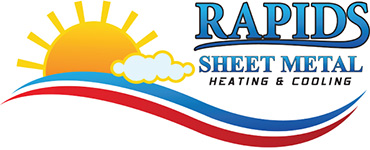As the scorching summer sunshine starts to fade and the refreshingly cool weather of fall starts to settle in, residents of Wisconsin Rapids start preparing their homes and yards for the wintertime. For many, that leads to the question of whether they ought to cover their outdoor air conditioner for the winter.
While it may seem like a good idea, the reality is there are a number of reasons why you shouldn’t cover your AC unit in the winter. In addition to not being needed, covering your outdoor air conditioning equipment can even cause problems.
Here, the professionals at Rapids Sheet Metal Works Inc share five reasons why covering your air conditioner doesn’t need to be on your fall to-do list and what you should do instead.
1. Snow won’t Hurt Your AC
Outside AC units are built to withstand harsh weather conditions like snow in the wintertime. These machines are built with sturdy materials and components that can handle the outdoor elements without damage. The coils and fins of the unit are engineered to resist corrosion, and the housing is manufactured to protect the internal elements from moisture and debris.
2. Covering AC Systems can Encourage Mold
One of the reasons you should avoid covering your AC unit in the wintertime is because doing so can trap moisture—which is the opposite of what you want in your outdoor unit. That’s because sealing moisture inside the unit generates the perfect conditions for mold and mildew to thrive.
Mold and mildew not only have an undesirable aroma, but they can also present health risks, especially for household residents with respiratory issues or allergies. Also, the trapped moisture can corrode the internal components of the AC unit.
Rather than covering the unit, instead ensure proper drainage and keep the area around the unit clear of debris, allowing for efficient airflow and preventing moisture buildup.
3. Covered AC Systems Can Host Animals
Humans aren’t the only ones who make plans for winter. Animals that live around your home are also looking for a warm, cozy place to hide out for the cold months. For many animals, a covered air conditioner is an ideal winter dwelling.
Birds, mice, chipmunks and even rats frequently make nests inside covered air conditioners. Animals residing in a covered AC unit can cause numerous problems. Mice can chew through wires, insulation and other parts, causing damage that may require pricey repairs. Debris animals bring into the AC to create a warm and comfortable place to get out of the cold weather can obstruct airflow and ventilation, decreasing the efficiency of the appliance and potentially causing it to overheat. Moreover, animal waste can result in unsanitary conditions and potent odors.
Leaving your air conditioner uncovered helps discourage animals, because an uncovered AC offers less shelter from the elements than a covered unit. That’s better for your AC—and leaves you with less mess to clean up and things to repair in the spring.
4. A Winter Cover for AC Units Restricts Airflow
Another reason you shouldn’t cover your AC unit in the winter is because a cover blocks airflow through the unit. Adequate airflow is essential for the AC system because it facilitates heat exchange and permits the unit to cool effectively. When airflow is reduced, the system has to work harder to maintain the desired temperature, causing greater energy consumption and strain on the components.
In addition, if you turn on your air conditioner without realizing that the outdoor unit is covered or because you simply forgot, it could result in a range of problems. One issue is that the lack of proper airflow could cause the compressor to overheat, leading to its failure or damage. That’s why it is necessary to ensure the outdoor unit is free from blockages and is not covered to maintain optimal airflow.
5. AC Maintenance Is More Effective Than Covering Your Air Conditioner
The bottom line is, it’s a lot more effective to do a little maintenance for your air conditioning unit than to cover your exterior AC unit.
There are a number of key maintenance activities you should prioritize to ensure the best possible function and longevity of your AC unit. First, it’s smart to examine your outdoor AC unit regularly and clear any debris such as leaves, sticks and dirt to maintain proper airflow. Second, inspect and clean the coils, fins and filters to make sure they are free from dirt and dust buildup that would impede successful heat exchange or airflow.
Regular air conditioning maintenance not only improves efficiency, but it also helps extend the unit’s life span, lowers energy consumption and protects against costly repairs. Rather than using a cover, committing time and effort into routine air conditioning maintenance is a proactive approach that can substantially benefit your entire HVAC system in the long run.
